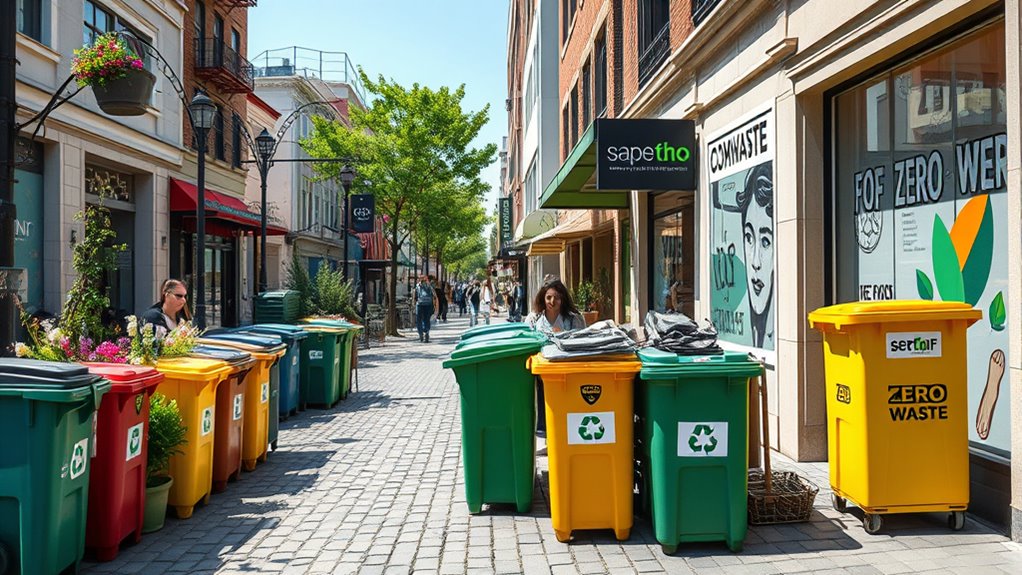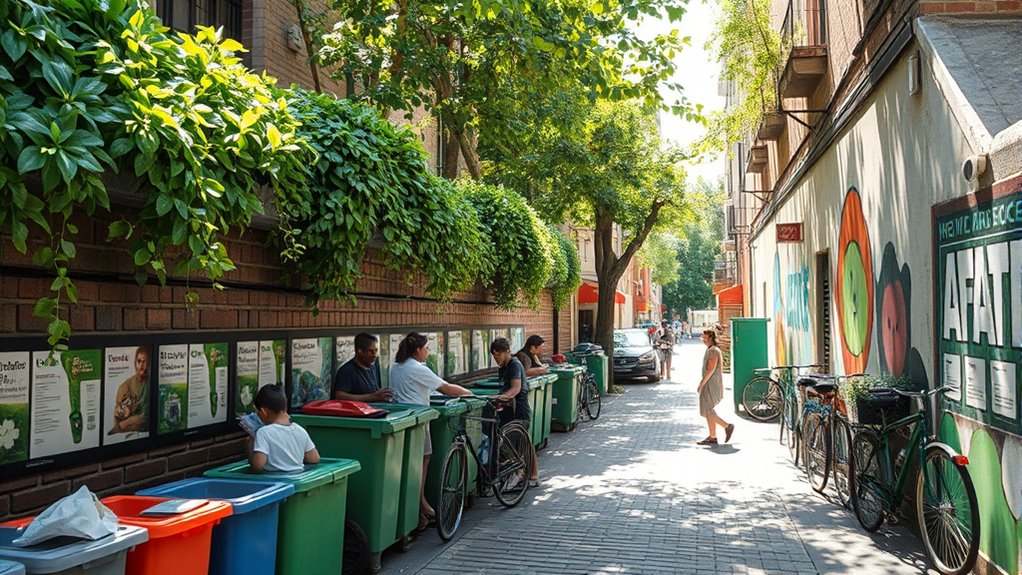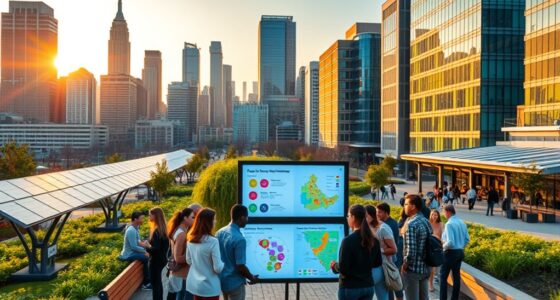Communities are winning the trash war by embracing innovative practices like urban composting and strong recycling programs. You can participate by sorting your waste properly, composting food scraps, and supporting local initiatives. These efforts help reduce landfill waste, cut pollution, and conserve resources. When residents work together and stay committed to sustainable habits, cities move closer to becoming zero-waste. Keep exploring to discover how collective action transforms urban waste management and creates greener communities.
Key Takeaways
- Community composting programs turn organic waste into nutrient-rich soil, reducing landfill volume and methane emissions.
- Proper recycling education and infrastructure encourage residents to sort and clean recyclables, increasing recycling effectiveness.
- Urban composting and recycling initiatives foster community involvement, boosting collective efforts toward zero-waste goals.
- Supporting eco-friendly vehicle modifications and sustainable practices further cut pollution and resource use in cities.
- Collective participation and innovative strategies are essential for cities to successfully reduce waste and achieve zero-waste status.

As cities grow larger and waste management becomes more challenging, the idea of zero-waste cities offers a promising solution. You can play an essential role in this transformation by embracing practices like urban composting and supporting community recycling programs. Urban composting allows you to turn food scraps and organic waste into nutrient-rich soil right in the heart of your city, reducing the amount of trash sent to landfills. Instead of tossing apple cores or vegetable peels in the trash, you can participate in local composting initiatives, which often involve community gardens or dedicated compost bins in neighborhoods. This not only diverts waste but also fosters a sense of collective effort and environmental responsibility. When you compost, you’re actively reducing methane emissions from landfills, as organic waste decomposes more cleanly in controlled composting systems. Additionally, promoting Volkswagen TDI Tuning and other eco-friendly vehicle modifications can help lower pollution levels in urban areas, supporting the initiative for cleaner cities.
Community recycling plays an essential role in moving toward zero waste. You can contribute by sorting your recyclables properly, ensuring that plastics, metals, and paper are clean and free of contamination. Many cities now have dedicated recycling centers or curbside pickup options, making it easier for you to recycle effectively. Beyond your household, you can get involved by supporting local recycling initiatives or advocating for better recycling infrastructure in your community. These programs often include education campaigns that motivate neighbors to recycle correctly, which is vital because contaminated recyclables often end up in landfills, defeating the purpose of recycling efforts.
By actively participating in urban composting and community recycling, you’re part of a larger movement to reduce waste and conserve resources. Zero-waste cities don’t happen overnight; they depend on collective effort and innovative strategies. When you compost, you’re not only reducing waste but also enriching urban soil, which can be used in community parks or urban gardens, further promoting local sustainability. Supporting community recycling efforts helps minimize pollution, saves energy, and reduces the demand for virgin materials. These practices also inspire others in your neighborhood to follow suit, creating a ripple effect that accelerates the city’s progress toward zero waste.
In essence, your actions—whether composting at home or engaging in neighborhood recycling programs—are essential pieces of the puzzle. As cities adopt smarter waste management practices, your proactive participation helps turn the vision of zero-waste cities into reality, making urban living more sustainable for everyone.
Frequently Asked Questions
How Do Zero-Waste Initiatives Impact Local Economies?
You might wonder how zero-waste initiatives affect local economies. These programs can boost economic growth by attracting eco-conscious businesses and tourists. They also create new job opportunities in recycling, composting, and waste management sectors. As you support zero-waste efforts, you help foster a sustainable economy that encourages innovation and community engagement, ultimately strengthening local prosperity and reducing environmental impact simultaneously.
What Challenges Do Cities Face When Implementing Zero-Waste Policies?
You face challenges when implementing zero-waste policies, mainly because public awareness isn’t always high enough to change habits. You also need to focus on infrastructure development, such as recycling centers and composting facilities, which can require significant investment and planning. Overcoming resistance and ensuring everyone understands the benefits are tough, but with community engagement and proper infrastructure, you can successfully reduce waste and move toward sustainability.
How Can Individuals Effectively Contribute to Zero-Waste Goals?
You can effectively contribute to zero-waste goals by adjusting your personal habits, like reducing single-use plastics and composting. Additionally, engage in community involvement by participating in local cleanup events, advocating for sustainable policies, and sharing your knowledge. Small changes in your daily routine combined with community efforts create a powerful impact, helping to reduce waste and inspire others to join the movement toward a cleaner, more sustainable environment.
Are Zero-Waste Cities Sustainable Long-Term Solutions?
You might wonder if zero-waste cities are sustainable long-term solutions. They can be if you support ongoing industrial innovation and strict policy enforcement. These cities reduce waste through innovative technologies and effective regulations, making sustainability achievable. By actively participating and advocating for continuous improvements, you help guarantee zero-waste practices stay viable, promoting environmental health and resource efficiency for the future.
What Role Does Education Play in Zero-Waste Community Success?
Think of education as the seed that sparks growth. It symbolizes the power to transform mindsets, fostering behavior change and community awareness. When you learn about waste impacts, you’re more likely to adopt sustainable habits, inspiring others to do the same. Your knowledge helps build a collective effort, turning individual actions into a community movement. Education empowers you to be part of the solution and sustain zero-waste success long-term.
Conclusion
Imagine a world where waste no longer rules your city, where every item has a purpose beyond the trash can. Cities are proving that zero waste isn’t just a dream—it’s within your reach. By embracing community efforts and innovative solutions, you can be part of the change. Will you let trash win, or will you rise and take your place in this waste-free revolution? The choice is yours—what will you do?









